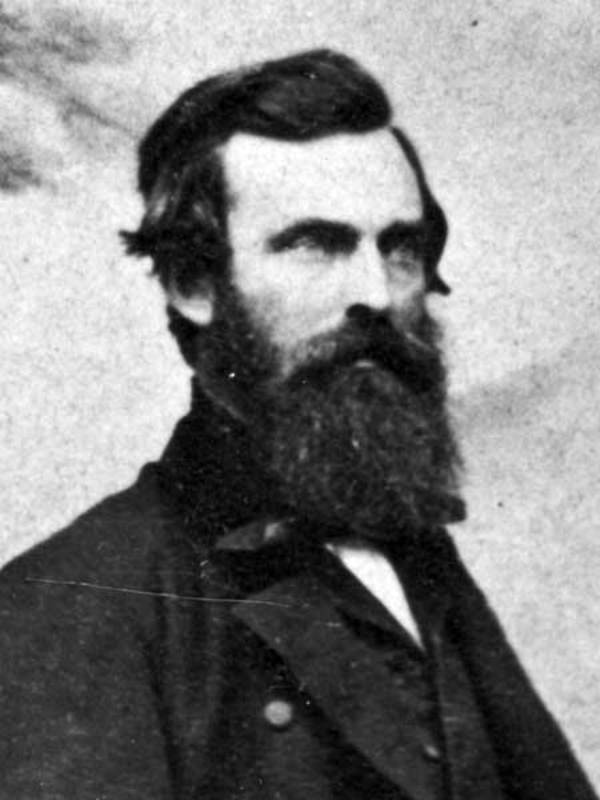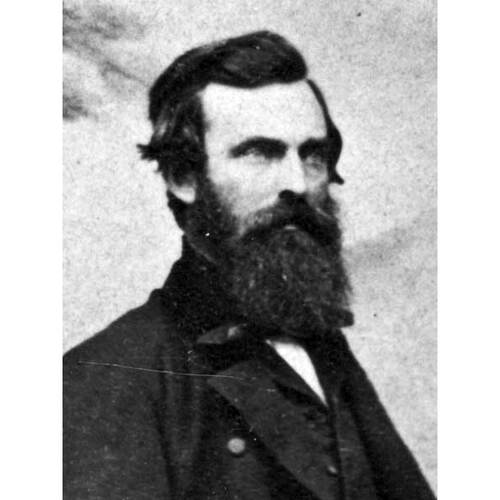
Source: Link
McKENNEY, HENRY, merchant and office-holder; b. c. 1826 in Amherstburg, Upper Canada, the second son of Henry McKenney, UEL, and Elizabeth Reily; m. 20 Aug. 1845 Lucy Stockwell, and they had two sons and two daughters; d. in late 1886 in Washington Territory.
Little is known about Henry McKenney’s early life except that, when a small general store he operated in Amherstburg ran into financial difficulties, he resolved to start a new life in the west. On 10 June 1859, with his wife and eldest son, he arrived at Upper Fort Garry (Winnipeg) on the maiden voyage of the Anson Northrup, the first steamboat to ply the Red River. Shortly thereafter McKenney rented a building from Andrew McDermot and converted it into a hotel. The Royal, as McKenney called it, was the first hotel in Manitoba.
The firm of McKenney and Company was formed to trade in furs and operate a general store located in the hotel. McKenney’s junior partner in this company was his half-brother, John Christian Schultz*. In 1862 McKenney sold his hotel to George Emmerling, and in June, with Schultz still as junior partner, he began to build a larger store at the intersection of the Portage la Prairie trail and the main road between Upper and Lower Fort Garry. Old settlers ridiculed the location as too isolated, but before long others built nearby. McKenney thus became the founder of Winnipeg; the store he built was located at what is today the corner of Portage and Main.
On 8 June 1861 McKenney had been chosen a petty magistrate, and on 25 Nov. 1862 Alexander Grant Dallas, governor of Assiniboia, appointed him to succeed James Ross* as sheriff of Assiniboia and governor of the jail. McKenney himself was a compulsive litigant; between 1859 and 1869 he was involved in 30 personal lawsuits, most of them trivial, before the General Quarterly Court of Assiniboia.
McKenney and Schultz dissolved their partnership in August 1864, and McKenney decided to carry on the business alone. He obtained a court judgement ordering Schultz to pay his share of a £600 debt incurred by the company. When Schultz belligerently refused payment, McKenney, with the aid of two special constables, had him bound hand and foot and carted off to jail. Thereafter the half-brothers were bitter enemies.
In August 1861 McKenney had erected a sawmill on the Manigotagan River at the east side of Lake Winnipeg, and became the first to exploit the timber resources of this area. He had a three-masted schooner, the Jessie McKenney, built to haul the sawn lumber to the Red River Settlement. The Manigotagan River project was not a success, however, and he abandoned it in the fall of 1869, shipping the machinery back to Upper Fort Garry.
During his ten years in Red River, McKenney played a prominent role in the community and faithfully fulfilled his duties as magistrate, sheriff, and governor of the jail. But when Louis Riel seized power in November 1869 and the future of Rupert’s Land was in question, McKenney, in spite of his loyalist background, was one of the few native Canadians in the settlement who advocated annexation to the United States. He supported the election of Alfred Henry Scott*, a clerk in his store, as the Winnipeg delegate to the convention of January 1870. There was a rumour in Red River of a special reason for his attitude to Canada: on 21 March 1870 Alexander Begg* reported a story that McKenney “fears the coming of the Canadian Government to Red River on account of old debts he left behind him some years ago in Canada.” McKenney’s dislike of Canada may have been influenced by his animosity towards Schultz.
In May 1870 when the union with Canada appeared certain, McKenney rented out his store to a hardware firm, resigned his shrievalty, and moved to Pembina (N. Dak.) where he built a small store and set up a sawmill. He became sheriff of Pembina County on 9 June 1871, and thus had the distinction of having served as sheriff in both American and British jurisdictions. It was difficult to obtain timber for his sawmill, and so he shut it down and in 1874 returned to Winnipeg, where he acted as a manager and legal adviser for his sons who had taken over his store. He also dabbled in oil-painting and was active in municipal politics. In the Winnipeg civic election of January 1876 he ran for alderman but came last in the poll. In August 1876 McKenney sold his Winnipeg interests and was reputed to have moved to Oregon. He died in Washington Territory, late in 1886.
PAM, MG 2, B4-1; MG 9, A46: 65; MG 12, E; Vert. files, John Christian Schultz. Begg, Red River journal (Morton). Canadian North-West (Oliver), I: 478, 515. J. J. Hargrave, Red River (Montreal, 1871). Manitoba Daily Free Press, 12 Feb., 10 March 1875; 3 Jan., 31 Aug. 1876. New Nation (Winnipeg), 28 April 1870. Nor’Wester, 2 Nov. 1864, 1 Dec. 1866, 25 Aug. 1868. William Douglas, “The forks becomes a city,” HSSM Papers, [3rd ser., no.1] (1944–45): 51–80. G. F. Reynolds, “The man who created the corner of Portage and Main,” HSSM Papers, 3rd ser., no.26 (1969–70): 5–40. “The sheriffs of Assiniboia, paper II,” Western Law Times (Winnipeg), 2 (1891): 1–10, 181–86.
Cite This Article
George F. Reynolds, “McKENNEY, HENRY,” in Dictionary of Canadian Biography, vol. 11, University of Toronto/Université Laval, 2003–, accessed December 31, 2025, https://www.biographi.ca/en/bio/mckenney_henry_11E.html.
The citation above shows the format for footnotes and endnotes according to the Chicago manual of style (16th edition). Information to be used in other citation formats:
| Permalink: | https://www.biographi.ca/en/bio/mckenney_henry_11E.html |
| Author of Article: | George F. Reynolds |
| Title of Article: | McKENNEY, HENRY |
| Publication Name: | Dictionary of Canadian Biography, vol. 11 |
| Publisher: | University of Toronto/Université Laval |
| Year of publication: | 1982 |
| Year of revision: | 1982 |
| Access Date: | December 31, 2025 |



